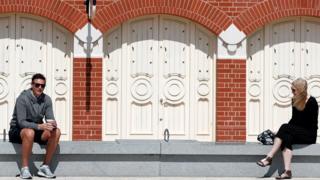 Image copyright Reuters
Image copyright Reuters Social distancing is a key method of keeping people safe and preventing the spread of Covid-19.
It means keeping a certain distance away from other people to lessen the risk of passing on – or catching – coronavirus.
What are the rules in each UK nation?
There is slightly different advice depending where you are:
- In Scotland people should keep 2m away from each other. From Saturday 10 October, First Minister Nicola Sturgeon has asked shops to reintroduce measures to support 2m physical distancing, such as one-way systems. There are exemptions in some places like pubs, and children aged 11 or under do not need to social distance
- In England, if you can’t stay 2m away, you can stay “1m plus” apart (the “plus” means doing something else to limit possible exposure, like wearing a face covering)
- In Wales, the guidance is to stay 2m apart unless it is not practical (for instance, at a hairdressers); primary-age children in Wales are also exempt
- Northern Ireland‘s guidance was 1m (3ft) for a time, but is now back at 2m
Social distancing is important because coronavirus is thought to spread mainly when an infected person coughs, sneezes or speaks, and transmits small droplets – packed with the virus – into the air.
These droplets can land in other people’s mouths or noses nearby or may be inhaled into the lungs. It’s also possible that you could be infected after touching a surface on which the droplets have landed.
The risks are far higher indoors than outdoors.
How can I meet other people safely?
Social distancing is a key element of meeting others safely.
The only people you do not need to socially distance from are:
- People in your household
- Anyone in your support bubble, if you have one
Otherwise, when seeing anybody else you must:
- Follow social distancing rules
- Avoid physical contact such as a handshake or a hug
- Not be too close or face-to-face
- Not shout or sing too close to them
How many people can I meet?
In all UK nations some areas have local restrictions in place. These may limit the number of people you can meet and where.
In areas without local restrictions, the rules differ.
In England, up to six people of any age from multiple households can meet indoors and outdoors.
In Scotland, people are being told not to visit other households or other private indoor spaces. In public indoor spaces six people from two households can meet. The same rule applies in outdoor spaces, including private gardens.
Outdoors, children aged 11 or under will be exempt from the headcount. Those aged 12 to 18 are exempt from the two-household limit and allowed to meet together outdoors in groups of six.
In Wales, it is now illegal for more than six people to meet indoors – and any people who do meet must be form an extended household. Children aged 10 and under do not count towards the total. Up to 30 people from different homes can still meet outside.
Social mixing of households is no longer allowed inside private homes in Northern Ireland – although there are some exemptions.
Up to six people from two households can meet in private gardens. In other places, both inside and outside, up to 15 can gather with social distancing – but venues, such as pubs, must carry out risk assessments.
Are there any exceptions?
Exceptions to social distancing rules in England include:
- A household or support bubble larger than six
- Education and training
- Workplaces
- Jury duty or other legal commitments
- Children’s play groups and youth clubs
- Group exercise classes
- Support groups, such as for addiction or abuse
Weddings and civil partnerships, with up to 15 people attending in groups of six or less, and funerals, with up to 30, can go ahead.
People can go to pubs, restaurants, shops, places of worship, a protest or other organised event, in groups of six or less, even though more people will be present.
However, these groups must stay separate and not mingle.
What are the rules for sports?
Organised outdoor team sport and exercise classes are exempt from the six-person limit if Covid-secure guidelines are followed.
But organised indoor team sport with more than six people is no longer allowed, although there is an exemption for people with disabilities. Indoor exercise classes can, however, carry on with larger numbers present.
In Scotland’s central belt region, First Minister Nicola Sturgeon has announced a two week suspension for all contact sports for people aged 18 or over, with an exception for professional sports, from 10 October.
That means the area covered by the health boards for Greater Glasgow and Clyde, Lanarkshire, Lothian, Forth Valley and Ayrshire and Arran – where cases of the virus have been rising sharply. It includes Edinburgh and Glasgow.
In this area, indoor group exercise activities for over 18s will also not be allowed for the same period.
Gyms can remain open for individual exercise, but snooker and pool halls and indoor bowling alleys will also close.
Can I be fined for breaking the rules?
The new measures mean police can break up groups larger than six.
Members of the group can be fined if they fail to follow the rules – £200 for a first offence, doubling on each further offence up to £6,400.
